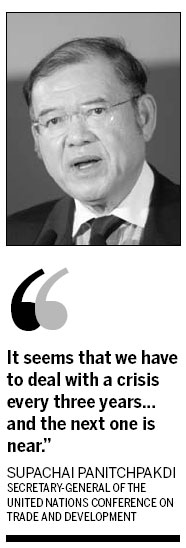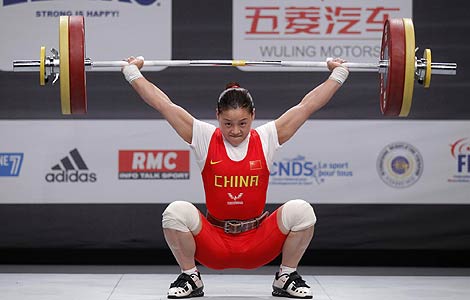Global leaders warn world plunging into 'uncertainty'
Updated: 2011-11-10 07:57
By Wei Tian (China Daily)
|
|||||||||
Rate of recession recovery may fall to as low as 2 percent next year
BEIJING - China's growth should not be the only hope of reversing the global recession, top officials from international organizations said, warning that the speed of global recovery may drop to as low as 2 percent in 2012.
The economies of developing markets are growing at a promising average of 6.5 percent, but that figure is only around 2 percent in developed economies, said Supachai Panitchpakdi, secretary-general of the United Nations Conference on Trade and Development.
"The recovery will be a slow process, because many countries have run out of stimulus policies in previous crises," Panitchpakdi said at the International Finance Forum's 2011 Annual Conference in Beijing on Wednesday.
"It seems that we have to deal with a crisis every three years and the next one is near," he said, while estimating that next year's growth will be 2 to 2.5 percent.
Panitchpakdi said developing economies cannot shoulder all the responsibility for global recovery, unless they are able to reap the fruits of their investment.
|
|
"As for the Chinese economy, it is only one-third the size of the United States. So even if China manages to maintain its annual growth rate of 9 to 10 percent, it cannot compensate for recession in the US and Europe," he said.
Christine Lagarde, managing director of the International Monetary Fund (IMF), addressed the same forum and echoed Panitchpakdi's words. She warned the world was at risk of plunging into "uncertainty and financial instability".
Asia is not immune to problems currently sweeping the eurozone, and it is up to wealthy nations to shoulder the burden of restoring growth and confidence, Lagarde said.
The IMF chief is in Beijing for a two-day visit and held a short meeting with Zhou Xiaochuan, governor of the People's Bank of China (PBOC), after the forum.
European policymakers have been urging China, with $3.2 trillion in foreign exchange reserves, to help end the debt crisis.
But opinions in China are firmly against bailing out European economies, where average incomes are higher, and many insist the aid should not be unconditional.
"The basic reason for today's crisis is that Western countries have overemphasized the development of the virtual economy and social welfare in the past 60 years," said Li Ruogu, president of the Export-Import Bank of China.
The solution would be to lift restrictions on exports to China, such as high-end technology and resources, which would help the country to move up the value chain, Li said.
Li Daokui, a member of the PBOC's monetary policy committee, said China shouldn't accept a timetable or conditions for reform set by other countries to participate in the IMF's special drawing rights (SDR).
He added that China should only accept a list of requirements that, once met, would allow the yuan to be included in the SDR.
Despite all the pessimism and complaints, transformation of the world's second-largest economy could still bring opportunities to the world by increasing domestic demand and promote environmentally friendly development, Li said.
China's imports will grow at 27 percent annually in the next five years, 5 percentage points higher than the export growth over the same period, said Lu Zhongyuan, deputy head of the State Council's Development Research Center.
Consumer spending in China will grow at an annual rate of 8.5 percent, which will significantly increase the contribution of consumption to its GDP, Lu said.
Energy consumption for each unit of GDP in China is predicted to drop 16 to 17 percent in the next five years, which offers significant potential for global cooperation in green technology, he said.
"The world will be increasingly dependent on an expanding Chinese market, but the success of transformation requires long-term effort. If there is any distraction from this effort, the promise of transformation will be hard to cash in," Lu said.
China Daily












